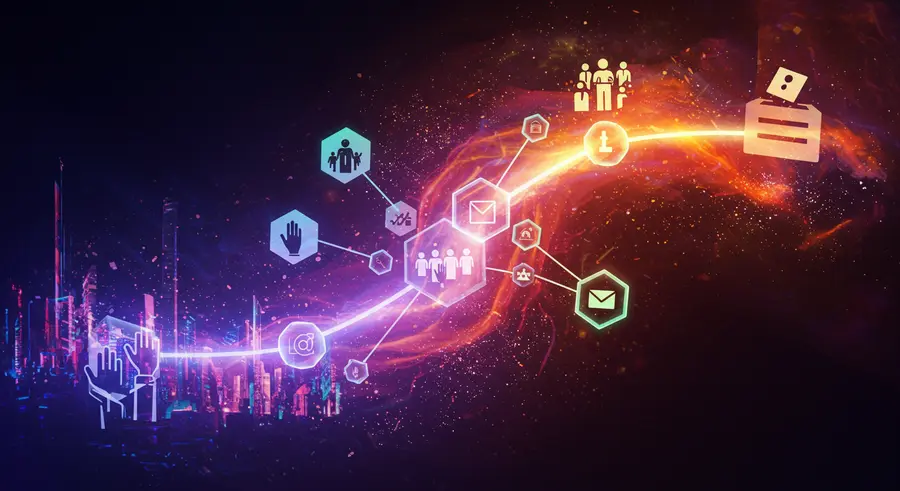Appearance

Welcome, tech pioneers and blockchain enthusiasts! 👋 Today, we're embarking on a fascinating journey into the world of Decentralized Autonomous Organizations (DAOs). If you've been exploring the vast landscape of Web3, you've undoubtedly encountered this term. But what exactly are DAOs, and how are they fundamentally reshaping the way we think about governance, decision-making, and collective action? Let's unravel the complexities and explore the profound impact of DAOs on the digital realm and beyond!
What Exactly is a DAO? 🧐
At its core, a DAO is an organization represented by rules encoded as a transparent computer program, controlled by the organization's members, and not influenced by a central government. Think of it as a company or a community that operates on the blockchain, where decisions are made democratically by its members through voting, rather than by a traditional hierarchy.
Here's a breakdown of key characteristics:
- Decentralized: No single entity has control. Power is distributed among all participants.
- Autonomous: Once launched, DAOs can operate independently based on their pre-programmed rules.
- Organization: They are structured entities with a shared goal, treasury, and a set of rules governing their operations.
The foundational technology enabling DAOs is, of course, the blockchain. For a deeper dive into the basics of blockchain and Web3, check out our introductory article: Introduction to Blockchain Technology and Web3.
How Do DAOs Work? 🛠️
The magic of DAOs lies in smart contracts – self-executing contracts with the terms of the agreement directly written into code. These contracts automate the rules and decisions of the DAO.
- Creation: A group of individuals comes together with a shared vision and encodes the rules of their organization into smart contracts.
- Funding: The DAO is often funded through token sales, where participants purchase governance tokens. These tokens usually grant voting rights.
- Governance: Token holders propose and vote on various aspects, such as treasury allocation, new initiatives, or changes to the DAO's rules. Every vote and transaction is transparently recorded on the blockchain.
The Impact on Governance: A Paradigm Shift 🚀
DAOs are not just a technological innovation; they represent a significant shift in how we can structure governance in a wide array of contexts.
- Transparency and Trust: All rules and transactions are on the blockchain, making them immutable and publicly verifiable. This fosters an unprecedented level of transparency and reduces the need for intermediaries or blind trust.
- Community Empowerment: Every token holder has a voice, allowing for truly democratic decision-making. This empowers communities to directly influence the projects they care about.
- Efficiency and Automation: Smart contracts automate many operational processes, reducing overhead and increasing efficiency. This can lead to faster decision-making and execution.
- Global Collaboration: DAOs enable seamless collaboration among individuals across the globe, transcending geographical and traditional organizational boundaries. This opens up new possibilities for decentralized work and project development.
- New Economic Models: DAOs can facilitate novel economic models, such as collective ownership of digital assets, decentralized finance (DeFi) protocols, and creator economies where value is shared directly with contributors.
Real-World Examples and Use Cases 🌍
DAOs are already making waves in various sectors:
- Decentralized Finance (DeFi): Many DeFi protocols are governed by DAOs, allowing token holders to vote on interest rates, collateral types, and protocol upgrades.
- NFT Collectives: Groups of art collectors are forming DAOs to collectively purchase and manage valuable NFTs.
- Gaming Guilds: Players in blockchain-based games are forming DAOs to collectively own in-game assets and make decisions about their gaming strategies.
- Venture Capital: Decentralized venture capital (DeVC) DAOs allow members to pool funds and vote on which projects to invest in.
- Social DAOs: Communities are forming DAOs to manage shared resources, organize events, and make collective decisions about their future.
Challenges and the Road Ahead 🤔
While promising, DAOs face challenges:
- Legal and Regulatory Uncertainty: The legal status of DAOs is still evolving in many jurisdictions, leading to uncertainty.
- Security Risks: Flaws in smart contract code can lead to vulnerabilities and potential loss of funds.
- Voter Apathy and Centralization Risks: Despite decentralization, there's a risk of voter apathy or concentrated power if a few large token holders dominate voting.
- Scalability: Processing a large number of transactions and votes on a blockchain can be a technical hurdle.
The future of DAOs is incredibly exciting, with ongoing innovations addressing these challenges. As the Web3 ecosystem matures, DAOs are poised to become even more prevalent, offering a powerful alternative to traditional governance structures and fostering a more equitable and transparent digital future.
Conclusion ✨
DAOs are more than just a buzzword; they are a testament to the power of decentralized collaboration and a glimpse into the future of organizational structures. By leveraging blockchain technology, DAOs are empowering communities, enhancing transparency, and redefining governance in the digital age.
What are your thoughts on DAOs? Share your insights in the comments below! 👇
Stay curious, stay decentralized!